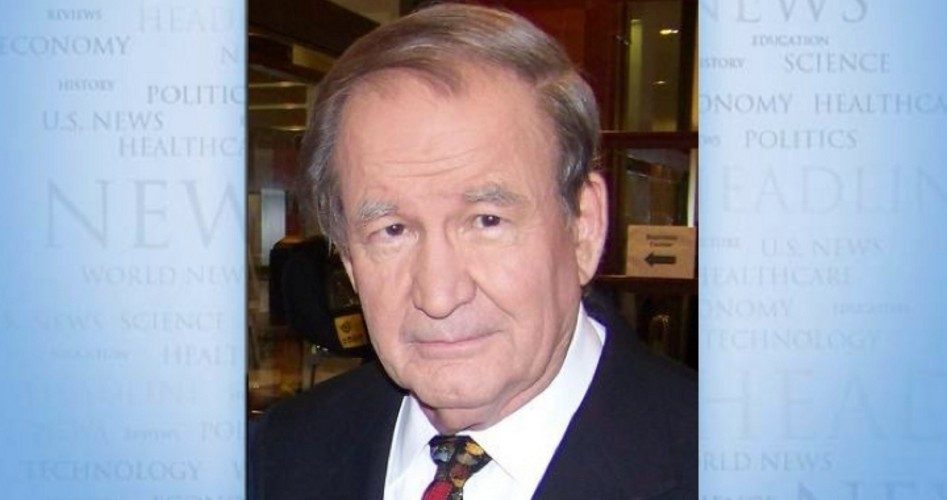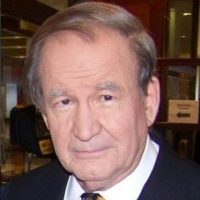
“McCain’s Death Leaves Void” ran The Wall Street Journal headline over a front-page story that began:
“The death of John McCain will leave Congress without perhaps its loudest voice in support of the robust internationalism that has defined the country’s security relations since World War II.”
Certainly, the passing of the senator whose life story will dominate the news until he is buried at his alma mater, the Naval Academy, on Sunday, leaves America’s interventionists without their greatest champion.
No one around has the prestige or media following of McCain.
And the cause he championed, compulsive intervention in foreign quarrels to face down dictators and bring democrats to power, appears to be a cause whose time has passed.
When 9/11 occurred, America was united in crushing the al-Qaida terrorists who perpetrated the atrocities. John McCain then backed President Bush’s decision to invade Iraq in 2003, which had no role in the attacks.
During Barack Obama’s presidency, he slipped into northern Syria to cheer rebels who had arisen to overthrow President Bashar Assad, an insurgency that led to a seven-year civil war and one of the great humanitarian disasters of our time.
McCain supported the expansion of NATO into Eastern Europe and the Baltic, right up to Russia’s border. When Georgia invaded South Ossetia in 2008, and was expelled by the Russian army, McCain roared, “We are all Georgians now!”
He urged intervention. But Bush, his approval rating scraping bottom, had had enough of the neocon crusades for democracy.
McCain’s contempt for Vladimir Putin was unconstrained. When crowds gathered in Maidan Square in Kiev to overthrow an elected pro-Russian president, McCain was there, cheering them on.
He supported sending arms to the Ukrainian army to fight pro-Russian rebels in the Donbass. He backed U.S. support for Saudi intervention in Yemen. And this war, too, proved to be a humanitarian disaster.
John McCain was a war hawk, and proud of it. But by 2006, the wars he had championed had cost the Republican Party both houses of Congress.
In 2008, when he was on the ballot, those wars helped cost him the presidency.
By 2016, the Republican majority would turn its back on McCain and his protege, Sen. Lindsey Graham, and nominate Donald Trump, who said he would seek to get along with Russia and extricate America from the wars into which McCain had helped plunge the country.
Yet, while interventionism now has no great champion and has proven unable to rally an American majority, it retains a residual momentum. This compulsion is pushing us to continue backing the Saudi war in Yemen and to seek regime change in Iran.
Yet if either of these enterprises holds any prospect of bringing about a more peaceful and prosperous Middle East, no one has made the case.
While the foreign policy that won the Cold War, containment, was articulated by George Kennan and pursued by presidents from Truman to Bush I, no grand strategy for the post-Cold War era has ever been embraced by a majority of Americans.
Bush I’s “New World Order” was rejected by Ross Perot’s economic patriots and Bill Clinton’s baby boomers who wanted to spend America’s peace dividend from our Cold War victory on America’s homefront.
As for the Bush II crusades for democracy “to end tyranny in our world,” the fruits of that Wilsonian idealism turned into ashes in our mouths.
But if the foreign policy agendas of Bush I and Bush II, along with McCain’s interventionism, have been tried and found wanting, what is America’s grand strategy?
What are the great goals of U.S. foreign policy? What are the vital interests for which all, or almost all Americans, believe we should fight?
“Take away this pudding; it has no theme,” said Churchill. Britain has lost an empire, but not yet found a role, was the crushing comment of Dean Acheson in 1962.
Both statements appear to apply to U.S. foreign policy in 2018.
We are bombing and fighting in Afghanistan, Iraq, Syria, Libya and Yemen, partly John McCain’s legacy. Secretary of State Mike Pompeo has sent a virtual ultimatum to Iran. We have told North Korea, a nuclear power with the world’s fourth-largest army, either to denuclearize or the U.S. may use its military might to get the job done.
We are challenging Beijing in its claimed territorial waters of the South China Sea. From South Korea to Estonia, we are committed by solemn treaty to go to war if any one of dozens of nations is attacked.
Now one hears talk of an “Arab NATO” to confront the ayatollah’s Iran and its Shiite allies. Lest we forget, ISIS and al-Qaida are Sunni.
With all these war guarantees, the odds are excellent that one day we are going to be dragged in yet another war that the American people will sour upon soon after it begins.
Where is the American Kennan of the new century?
Photo of Patrick J. Buchanan: By Bbsrock – Own work, CC BY-SA 3.0
Patrick J. Buchanan is the author of a new book, Nixon’s White House Wars: The Battles That Made and Broke a President and Divided America Forever. To find out more about Patrick Buchanan and read features by other Creators writers and cartoonists, visit the Creators website at www.creators.com.
COPYRIGHT 2018 CREATORS.COM



